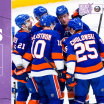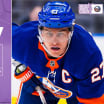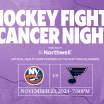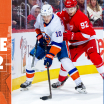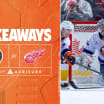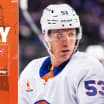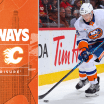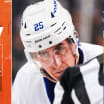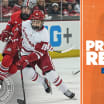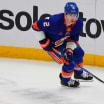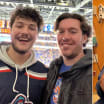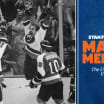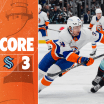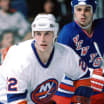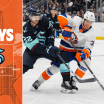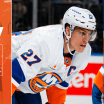Having disposed of the Rangers in an unusually pulsating first playoff round in the Spring of 1975, the Islanders next faced the Pittsburgh Penguins in a best-of-seven quarter-final
The primary issue concerning coach Al Arbour and captain Ed Westfall was an inevitable letdown that would follow such an emotional triumph. The other challenge, of course, would be the offensively strong Penguins.
"This was a very good Pittsburgh team," said Westfall, "We knew we'd have our hands full."
Maven's Memories: Isles Epic Comeback vs Penguins
Stan Fischler looks back at how the Islanders overcame a 3-0 series deficit against Penguins in 1975 playoffs
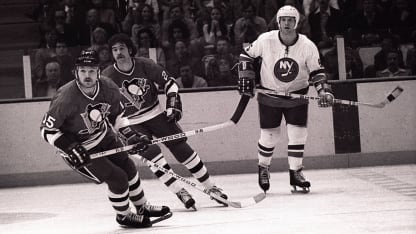
© B Bennett/Getty Images
By
Stan Fischler
Special to NHL.com
The Islanders net -- now manned by Bill Smith who had beaten the Rangers -- was full, too; unfortunately filled with Penguins pucks. After three games, Smitty had allowed 14 goals, leaving the Isles down, three games to none.
As hockey history clearly indicated, the Nassau skaters were in a seemingly hopeless situation. In the 36 years since the NHL adopted the best-of-seven playoff series, only one club ever had lost the first three games and then rebounded to capture the next four.
It happened in the Spring of 1942 when the Toronto Maple Leafs rallied out of a 3-0 hole to upend the Detroit Red Wings and win the Stanley Cup.
The difference between those Leafs and these Islanders was that the Toronto outfit was sprinkled with Hall of Famers such as Syl Apps, Turk Broda and Babe Pratt while the Isles iced a mostly young, inexperienced squad.
Another unexpected Islanders trauma involved Arbour who was suffering from a slipped disk that caused severe back pains. Radar had to be hospitalized between games and practices.
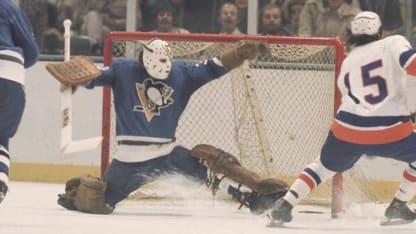
© Tony Triolo/Getty Images
After the Penguins had successively won by scores of 5-4, 3-1, and 6-4, Al left the hospital feeling depressed; believing he had let his team down by not being around enough. But now, he was with them in the dressing room prior to Game Four on April 20, 1975.
A hush came over the room as the bespectacled mentor addressed his troops who were visibly moved just by studying Arbour's body language.
"Men, I have to apologize to you for not being able to coach you in the manner I'd like," he said for openers. "I feel I owe you an apology for not doing more for you all."
Then, he trooped on to the Coliseum ice with his men for a scrimmage. That done, he convened the players one more time: "If there's anyone here who doesn't feel we can come back and beat those guys, get off the ice immediately," Al asserted.
To many of the Islanders, it wasn't so much the words spoken but the manner in which they were delivered; and how much Radar had done for the club up until that point in time.
"He said it with so much conviction," said J.P. Parise. "It showed how much he believed in us. He made us see that, by concentrating on a shift at a time and not looking three games ahead, it wasn't all that insurmountable."
It has been written -- and said -- that Arbour's apology and then challenge to his skaters proved to be a turning point in the series although nobody could have known it at the time. All the Nassau fans knew was that their favorites had their backs to the Coliseum wall.
Meanwhile, many of the Islanders did some serious self-reflection; among them Bob Nystrom who had enjoyed an exuberant regular season but now was slumping through six scoreless playoff games.
Denis Potvin was another who had been skating in three-quarter time, far below his high standard. Hampered by a pulled thigh muscle, the rugged defenseman was hoping that treatment would get him back to full speed.
The Penguins had every reason to be confident. Having solved the Bill Smith puzzle over three games, dazzling the Isles with their offense, nobody on the Pittsburgh side doubted that they'd out the Islanders in Game Four at Uniondale.
With one exception.
Bob (Battleship) Kelly, the pugnacious Pittsburgh forward, had been challenged by enough of the foe to sense that the series just might go more than four games.
Battleship Kelly: ""The Islanders are like a disease that you can't get rid of!"
Arbour's plan to prove Kelly correct was to replace Smith with Resch, who had been chomping at the bit to get back between the pipes.
"I feel I can stop them," Chico insisted. "We can turn this thing around if we play our game."
If Resch needed encouragement, it was provided by a banner hanging from the Coliseum mezzanine when he arrived for Game Four: REMEMBER THE '42 MAPLE LEAFS.
"We were a different team when we started Game Four," Westfall remembered. "We weren't playing to win the game; or the period. We were playing to win each shift. That's all we thought about for the rest of the playoffs."
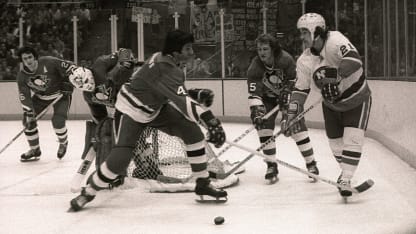
© B Bennett/Getty Images
There was a lot to think about through the early minutes of the third period in Game Four; like wondering which team would get the tie-breaking goal in the 1-1 game. "You got to keep pressing them in their own end," Arbour exhorted his brigade. "Go after them!"
Sure enough, the forechecking paid off when defenseman Gerry Hart skimmed a pass to Clark Gillies who beat Garry Inness, the Pitt goalie. Only 39 seconds later J.P. Parise illuminated the red light. After that, Resch blockaded the crease. Final Score, 3-1 Islanders!
In the game's aftermath it generally was agreed that one victory does not win a seven-game series. But the triumph ignited the confidence that had vacated the Isles room for a good week.
"We finally played our type of game," Arbour enthused. "Lots of good checking. Let's hope we can keep it up."
J.P. Parise: "You have to win the first before you win the fourth!"
To win the second game Bill Torrey produced a metaphysical -- or just plain good luck --plan by changing airlines for the flight to Pittsburgh and Game Five. Bow Tie Bill also booked his men into a different hotel, the Howard Johnson Motor Inn.
Torrey: "When you're in the position we're in, you try anything."
Nobody brought a set of rabbit's feet but Billy Harris -- he hadn't scored a goal since Game One against the Rangers -- shaved his beard for good luck in the hopes he could get off his schneid.
Billy must have known something; at 2:11 of the first period he blasted a 45-foot snapshot past Inness. Some press box regulars began thinking that the worm was turning; at least a little bit. But turn it did.
Ralph Stewart, who previously had been in Arbour's doghouse, returned to the lineup and repaid Radar by scoring New York's second goal.
By the third period, Chico's goaltending magic allowed his pals to stay ahead, 3-2. But with a minute remaining in the third period, Pittsburgh yanked Inness for an extra skater and launched a do-or-die attack.
It died -- but only after what has gone down in NHL annals as the longest open net goal ever in playoff history. Here's how:
After the Penguins deposited the puck behind the Islanders net, Jude Drouin got there first and followed through with a desperate zone-clearing thrust remembered by many.
In his book, "The Incredible Islanders," author Tim Moriarty, who covered the game for Newsday, described this open-netter for the ages:
"Drouin wound up with the puck behind the Islanders net. He banked it off the rear boards where they curve at the right corner and the puck caromed into center ice and travelled slowly but surely into the Pittsburgh net; a distance of 198 feet."
With unnecessary modesty, Jude downplayed the magnificence of his move:
Drouin:"I just wristed the shot off the boards. I only wanted to make sure I'd get it out of our end. When it hit the boards it started to curve towards the center and then I saw it moving closer and closer to the net. Then I saw it go in and I said to myself, 'Jude, that was some shot.'"
And some win; this time 4-2, Islanders, with a bushel of "Thanks" to Resch and his 36 saves.
Only one win away from tying the series, the Islanders returned home for Game Six on April 24th, 1975. Their plane landed a day earlier at LaGuardia Airport where the team's charter bus awaited them.
Hawley Chester III, who had been the club's publicity director since its its inception, looked out of the bus window as it cruised along the Long Island Expressway. Chester did a double-take when he noticed several clusters of forsythia in bloom along the highway.
He turned to Torrey, his boss, and chirped, "Bill, did you ever think we'd still be playing when the forsythia bloomed? This is something!"
The air of defeat that once had permeated Nassau Coliseum had been cleansed since the fifth game win. "We went into Game Six with a different attitude," said Westfall. "You could see everything turning."
A sellout crowd (14,865) greeted their favorites as the Nassaumen took the ice in an effort to keep their playoff hopes alive. In the first period, Resch manned the barricades and got a lot of help from his friends -- the goal posts.
On one Pittsburgh offensive, sniper Ron Schock's shot beat Chico but the puck harmlessly bounced off the pipe, then across the goal mouth before Glenn finally smothered the elusive rubber.
In a rare gesture of gratitude and affection, the relieved goalie then gave the piping a great big kiss. Pierre Larouche eventually beat Resch in the first period after Ralph Stewart had put the Isles ahead.
The 1-1 tie extended late into the second period; one of those tight-checking playoff games that had press box denizens predicting that the next goal would win the game. But who would deliver?
Of all the unlikely heroes it turned out to be a player who had yet to score in eight previous playoff games. But with less than five minutes remaining in the period, Garry Howatt relieved defenseman Dennis Owchar of the puck and beat Inness from up close.
That's all the Islanders -- especially their goaltender -- needed. Holding tight in the third period, Resch was stimulated to his best saves yet, followed by choruses of CHEE-KO, CHEE-KO.
They were followed by an all-arena fearful gasp as Pierre Larouche's shot whirred past Resch only to sound the all-clear clang as it rebounded off the iron, saving Resch once more.
Finally, with 26 seconds left in the third period, Westfall found the open net and -- as an extra added attraction -- with one second remaining, Howatt did an encore.
The 4-1 margin meant that Arbour's astonishing troupe now was a mere one win away from accomplishing what only one other team in NHL history had done before.
While jubilant comments echoed through the high decibel dressing room, a well-scared veteran was asked whether his team could do it one more time. Bert Marshall had a reasoned reply:
"We've only partly accomplished what we started out to do. If we don't finish the job, it will all be wasted. All it will show is that we didn't quit."
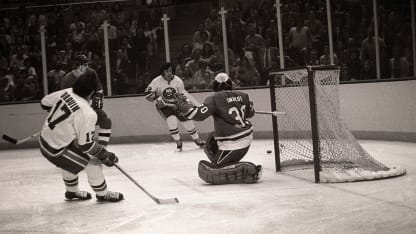
© B Bennett/Getty Images
LISTS: TEN MEN WHO TURNED THE SERIES IN THE ISLES FAVOR:
1. GLENN RESCH: Like a seasoned relief pitcher coming to the mound to save a ball game, Chico took over from Bill Smith in Game Four and refused to lose. His triumph in that critical contest gave his teammates hope and they took over from there -- while Glenn never buckled.
2. ANDRE ST. LAURENT:One of the littlest Islanders scored one of the franchise's biggest goals to start Game Four. Even though Pittsburgh tied the game, the Penguins never were able to take the lead.
3. CLARK GILLIES:Among the largest of Arbour's stickhandlers, Jethro potted the go-ahead goal in Game Four and the Isles rode the momentum to eventual victory.
4. GERRY HART: The fire-pump-sized defenseman also contributed to the offense. It was Hart's wise decision to slide a pass to Gillies rather than shoot that set Clark up for the Game Four winner.
5. JUDE DROUIN:Continuously in the right place at the right time, the French-Canadian vet forever will be remembered for his 198-foot open net goal that provided a cushion in the 4-2 Game Five win, giving the Isles some genuine momentum moving back home to Nassau for the sixth encounter.
6. ED WESTFALL:Arguably the league's best defensive forward, Number 18 produced the winning goal in Game Five while endlessly providing leadership both on and off the ice.
7. AL ARBOUR: His inspirational chats after the club dropped its third straight game at the series' start ranks among the best pep talks in sports. From there he out-coached Pittsburgh's Mark Boileau through Game Six.
8. RALPH STEWART: Unhappy with Stewie's early work, Arbour finally inserted him in Game Five and the former "Puck's Bad Boy" turned good with solid offensive work, especially in Game Six when his goal broke the scoreless tie in the second period.
9. GARRY HOWATT:Another pint-sized bundle of energy, Howie broke out of a slump to pot the game-winning puck in the second period of Game Six, leading to the 4-1 margin of victory.
10. BILL TORREY:You may not believe in good luck charms but Bow Tie Bill certainly did once his club wound up behind the eight ball. Between changing airlines, switching hotels and an assortment of other acts of hope, the general manager coaxed his guys to the verge of a humongous upset.
(NEXT WEEK: HOW THE ISLANDERS COMPLETED THEIR MIRACLE PLAYOFF COMEBACK.)

